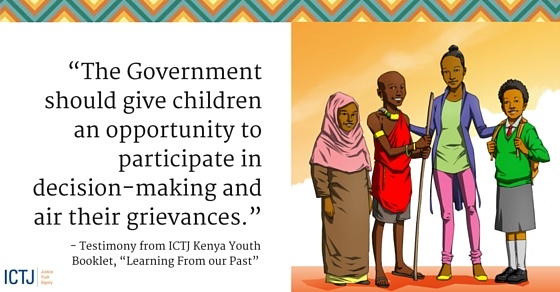Guest blogger, Clara Ramírez-Barat, shares how a two-year research project with the International Center for Transitional Justice (ICTJ) and the United Nations Children’s Fund (UNICEF) is exploring innovative strategies to engage young people in justice and peace-building efforts through education. Facing History’s international director, Karen Murphy, has played a lead role in this emerging field. She wrote a case study for that project and previously teamed up with ICTJ to develop a children’s guide to the Kenyan Truth, Justice, and Reconciliation Commission to help youth address complex parts of their country’s history.
Whether it’s knowing what happened to those who disappeared during Argentina’s last military rule from 1973 to 1986 or rebuilding communities after Sierra Leone’s brutal ten year civil war in the 1990s, restoring justice in the aftermath of massive human rights violations is pertinent to prevent future atrocities. But what about how these violent histories are understood by and transmitted to younger generations?
Education has been typically neglected in the field of transitional justice, which attempts to restore democracy and peace in post-authoritarian or post-conflict societies. This is usually done through measures like criminal prosecutions, truth commissions, memorialization initiatives, reparations programs, and various kinds of institutional reforms. But, when it comes to the longer-term effect of its message, we must consider how these pasts are socially and culturally reconstructed when passed down from generation to generation. Although children may not have lived through a conflict, they live in the society that has resulted from it, which is why educators can play a critical role in fostering understanding, empathy, and – ultimately – civic learning from our history.
This is what inspired ICTJ to embark on a two-year research project with UNICEF that explores how education can keep past tensions from turning into recurring episodes of mass violence. The study also aimed to develop innovative strategies to engage young people in justice and peace-building efforts through education. In November 2015, ICTJ released a report detailing how this research can inform the transitional justice process within the education sector to identify legacies of past conflict.
This research builds on previous efforts by ICTJ’s Children and Youth Program to develop transitional justice outreach programs geared towards children and youth, to ensure their right to participation. A recent example of this work was the development of a new tool with Facing History and Ourselves for youth in Kenya. “Learning from Our Past: An Exploration of Truth, Justice, and Reconciliation in Kenya” is designed to help younger Kenyans learn and critically reflect about difficult periods in their country’s history—especially the post-election violence crisis from 2007 to 2008—and helps them discuss justice, democracy, and their role as Kenyan citizens.
The 80-page booklet combines Facing History’s approach of incorporating real-life stories with ICTJ’s expertise in helping societies address legacies of massive human rights violations. Addressed to young people, readers are encouraged to explore their own roles in shaping their communities and consider how they can be agents of social change, both positive and negative.
ICTJ will release, Transitional Justice and Education: Learning Peace (New York: SSRC, 2016), in the coming months to further the conversation. This edited volume examines how transitional justice has been used and can be used to redress past wrongs and support the development of future generations so they have the skills, knowledge, and capacities to nurture and protect their civil societies.
Much more can be done if we work with educators from all over the world to develop similar tools that respond to post-conflict societies’ needs. Merging educational programs like Facing History’s with transitional justice efforts can be a powerful approach with the potential to support youth to become active global citizens who make positive, informed decisions.


